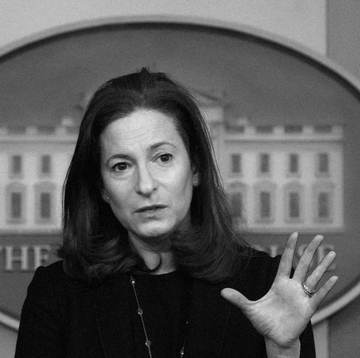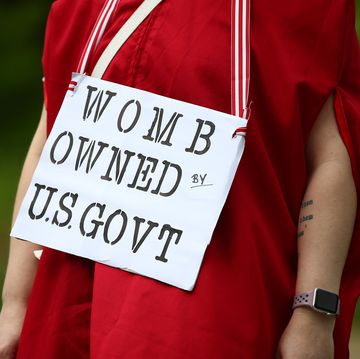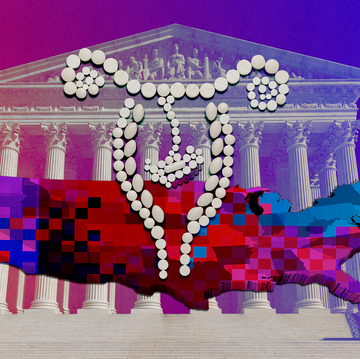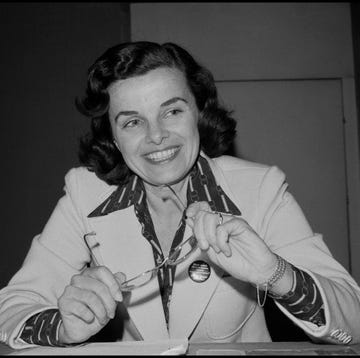Growing up in rural Crescent, Oklahoma, Chelsea Manning found an oasis in a favorite room of her family home. "I loved being in my sister's room. I really admired her and wore her clothes to play in, played with her dolls, played with her makeup," she says. "She had a mirror with settings to see what you would look like in different lighting. I thought that was amazing."
Back then, Manning was known as a boy named Bradley. Today, Manning is a transgender woman, living in a prison for men.
She is also easily one of the most controversial figures of the early 21st century. Bradley Manning made history as a U.S. soldier in 2010 by leaking hundreds of thousands of classified military documents to WikiLeaks, saying the goal was to unveil the human cost of war. To supporters, Manning was a human rights champion. To authorities, a criminal and an anarchist. In August 2013, Manning was sentenced to 35 years in prison. After the sentencing, Manning grabbed even more sensational headlines by announcing: "I want everyone to know the real me. I am Chelsea Manning. I am a female."
Manning got a legal name change and requested treatment for gender dysphoria, the medical term for people who identify with a different gender than the one they were assigned at birth. Military doctors had diagnosed her with the condition, according to the American Civil Liberties Union. After a year without the medical care, which includes hormone therapy and female grooming, Manning and the ACLU sued the military. At press time, the Army had agreed to permit some care — hormones, makeup, and female underwear — but not long hair.
In her first interview with the press from military prison in Fort Leavenworth, Kansas, Manning told Cosmopolitan about her experience behind bars and her lifelong desire to live as a woman. The interview was done by mail, as the military does not allow prisoners to speak with reporters by phone or in person.
Manning, 27, says her quest for medical care has been distressing because she feels "like a joke" to military officials. She says she is optimistic about the recent progress but that it is "painful and awkward" to be forbidden from letting her hair grow. "I am torn up," she says. "I get through each day OK, but at night, when I'm alone in my room, I finally burn out and crash."
At press time, the case was moving ahead. "The fact that Chelsea is receiving hormone therapy and other treatment for gender dysphoria is an important victory for her that will hopefully ease her distress," says ACLU staff attorney Chase Strangio. "But her fight continues because the government is needlessly prohibiting her from growing her hair, which will continue to cause her significant anxiety." The Army referred questions on the case to the Department of Justice, which said it could not comment on pending litigation.
Manning says she has spent much of her life feeling disconnected. "I spent a lot of time denying the idea that I could be gay or trans to myself. From the ages of 14 to 16, I was mostly convinced that I was just going through 'phases.' I ran away mentally, especially at night with access to the Internet and the labyrinth of anonymous communications," she says. "I don't know how [this struggle] shaped my life and who I am, but it's absolutely a factor in the decisions that I made before and including when I enlisted in the Army."
Manning recalls secretly dressing as a girl starting when she was 5 or 6 years old in quiet moments in her older sister's room. "I had always known that I was 'different.' I didn't really understand it all until I got older," she says. "But there was always this foreboding sense something was 'wrong.' I never knew how to talk about it. I just remember feeling terrified about what would happen if someone found out. It was a very lonely feeling."
Bullies descended in grade school, she says. Manning was short and small, and kids called her "girly boy" and "faggy." Her father's advice, she says, "was to 'man up,' and if anyone gave me problems, 'punch them in the face.'" This kind of advice led to "a lot of fights in school," she recalls.
She remembers a rocky home life, with parents who were often distant and dismissive. At one point, she recalls, her mother tried to commit suicide. Her sister, Casey, reportedly described the incident at Manning's trial, saying she drove the family to the hospital while Manning sat in the backseat with her mother. Says Manning, "It was a terrifying experience, for sure. But it seemed perfectly normal to me then."
Manning later moved overseas to Wales with her mother, whose marriage had crumbled. She began high school and sought friends she could trust. "There were a lot of points where I would start to come out, face stern resistance and mockery from people I thought were my friends, and then reverse course. I was scared," she says. "I don't think I ever said 'I'm gay' or 'I'm trans.' It was more like, 'Is it normal for guys to crossdress a lot?'"
Manning's father, Brian Manning, has sharply different memories, recalling a child who liked to play with Legos and the family computer, not in Casey's room. He remembers a happy household, no bullies at school. He does not believe that Manning could have leaked hundreds of thousands of documents alone without catching the attention of colleagues. Having worked in information technology for 30 years, he says, "I know what you can do and what you can't do."
Manning's mother, Susan Manning, said through a representative at the Private Manning Family Fund that her child has always been idealistic and she believes this is the root of any leaks. She said she supports Manning "one hundred percent" in her desire to live as a woman.
More turmoil followed Manning's return to Oklahoma after high school in 2005. She lived with her father and got an internship as a software programmer and designer, but both the job and the relationship with her dad went south. A period of homelessness followed, during which she largely lived out of her truck in Chicago. She later moved in with an aunt near Washington, D.C., enrolling at Montgomery College. She worked 60 to 70 hours a week at two sales jobs to pay for it, she says, and the juggle became "insane."
Thoughts of living as a woman loomed. "But my schedule was hectic, and therapists cost a lot of money," she says. "And even though I started seeing a psychologist with the specific intent of exploring my trans identity, I panicked and never brought up the subject with her. It was all exhausting me to the point I was turning to soda, cigarettes, and the Internet for an escape."
A future in the military came into focus, urged on by her father. "I was following the coverage of the Iraq war and the ongoing 'surge,'" she says. "I began to wonder if I could help out. Sure enough, I enlisted." Another thought occurred too: Perhaps the macho environment would distract her from thoughts of living as a woman.
Basic training in Missouri in 2007 was rough. "I absolutely was caught off guard by the intensity," she says. "There were points when I was humiliated pretty badly. One of the drill sergeants who inventoried my personal belongings made comments about my phone: It was pink. I didn't think much about bringing it with me — I just liked it."
One difficult night, she says, is "burned in my memory." It came after a long day of marching with weapons loaded with blank rounds. "We arrived at a range where you low-crawl under razor wire," she says. As she was crawling, she says, her weapon got stuck in semiautomatic-fire mode. She became frustrated and tried to force the switch back. "This was a stupid idea," she says. "It went off." The blast infuriated the tired recruits. The next night, "I was jumped by two of the guys who lived with me," she says. "They turned off the lights and tried to push me into my wall locker so they could lock me inside of it. I fought back." A sergeant came as Manning was ready to strike a blow, she says, and she was sent to a behavioral health clinic for "fits of rage." She says she kept the locker incident to herself, and the guys "respected that and left me alone."
Manning went on to become an Army intelligence analyst in New York and prepared to deploy to Iraq. She entered a happier phase, beginning a relationship with a student at Brandeis University. "I fell in love with him. He was not my first relationship, but he was certainly the most serious one," she says. He was the first person Manning recalls telling about her desire to be a woman.
Manning kept her relationship quiet at work, in line with the "Don't Ask, Don't Tell" policy of the time. But in the lead-up to her deployment to Iraq, she says, supervisors began inquiring about her personal life. "I was getting frustrated because they were being nosy and they were digging in deeper because I was resisting their questions, for the sake of protecting my career," she says. "It was a very high-stakes situation for me: I just wanted to deploy, do my job, and do it well. Hiding myself made this virtually impossible."
To supervisors, these anxiety-ridden interactions were a red flag, and Manning got sent to counseling. The deployment moved forward. When Manning landed in Baghdad, she and her boyfriend began to "drift apart," she says.
Iraq became a turning point emotionally. The experience "made me absolutely certain of who I am," she says. "Dealing with reams and reams of emails, memos, and reports of people dying around me every day — to the point it becomes just a statistic to many people — made me realize just how short and precious our lives really are. I could've been killed at any moment too. We all can, really. So what better day to start being ourselves than today, right? Yeah, it sounds tacky, but it's absolutely true. When I went on leave in January 2010, I was comfortable dressing as a woman in public. I wouldn't have been able to do that before I deployed to a combat zone."
Manning declined to answer questions about the massive document leak. In a statement after the trial, she said she wanted to help, not hurt, people. "It was not until I was in Iraq and reading secret military reports on a daily basis that I started to question the morality of what we were doing," she said. She cited the killing of innocent civilians, a lack of public accountability, and turning "a blind eye" to torture.
The prosecutors had a different take — that Manning was a traitor. Prosecutors called the leak the biggest in U.S. history, arguing that the classified documents provided "potentially actionable information for targeting U.S. forces," putting soldiers at risk and harming national security, according to the Army News Service. Manning pleaded guilty to 10 offenses and was found guilty of 20, including theft of government information. She was acquitted of the most serious charge, aiding the enemy. Her attorneys are working on an appeal. In a recent victory for Manning, an Army court of appeals ruled that the military must refer to her in court filings using female pronouns or neutral language, such as "Private First Class Manning."
By the time Manning received her prison sentence, Julian Assange, the editor of WikiLeaks, had become a high-profile figure, played by Benedict Cumberbatch in a DreamWorks movie, The Fifth Estate. Manning declined to answer questions about Assange, who has claimed asylum at the Ecuadorian embassy in London.
Manning says it was "very much a relief" to announce that she is a woman after the sentencing. She didn't fear the public response: "Honestly, I'm not terribly worried about what people out there might think of me. I just try to be myself."
Manning spent three years behind bars awaiting trial. She says nine months of that time were spent in de facto solitary confinement at a military base in Virginia — no personal items allowed. "I had to ask for permission to use a toothbrush, toothpaste, and toilet paper, and when I was done, I had to give these items back," she says. "I only got through it through humor. I just laughed at the entire situation. It became such a comical joke to me after a while. Unfortunately, you can't reason with absurdity. It's hard to lose your sanity when you're living in such an insane situation." After a public outcry, Manning was moved to Fort Leavenworth.
Today, Manning has her own cell with "two tall vertical windows that face the sun." She can see "trees and hills and blue sky and all the things beyond the buildings and razor wire," she says. "My mind barely acknowledges the buildings anymore." She spends much of her time in the prison library, where she types up homework for a degree in political science. She works out in the gym and has a job in a woodworking shop, which she describes as "very fun, actually."
She says she hasn't faced harassment from inmates and has found some confidantes. "The guys here are adults ... There are some very smart and sophisticated people in prisons all across America — I don't think television and the media give them credit," she says. She gets visits from friends and relatives, including regular visits from her sister. The prison forbids visits from people Manning did not know prior to her confinement.
She receives letters from transgender people around the world. "I am always flattered that they feel that I have inspired them in some way," she says. "But honestly, I think it's the other way around: They inspire me more than I think they might realize." Birthday cards have reportedly arrived from designer Vivienne Westwood, REM's Michael Stipe, and Edward Snowden, who famously leaked documents from the National Security Agency and has claimed asylum in Russia.
Manning says she hasn't seen Orange Is the New Black — there's no Netflix in prison — but is aware that the show features a transgender woman living in a women's jail. She notes that this scenario is unusual, because the vast majority of incarcerated transgender women are housed in male facilities. But the show is "spot-on," she says, in featuring a transgender character with a history of stealing. Transgender people are "all too often disowned by families and basically left for dead on the street," turning to petty crime, she says.
She says she was deeply moved by a letter she received from a transgender woman facing backlash from her family. "I cried, and couldn't stop crying, after I read her story. I had to write her back, but I haven't heard from her since," she says. "I only need to look at the recent suicide note of Leelah Alcorn in Ohio to see that the desperation and tragedy I felt growing up is still around today." Alcorn was a transgender teen who walked into oncoming traffic after posting a good-bye online. Says Manning, "I've drafted similar notes at tough times in my life."
Manning could get out on parole in around seven years. But she still wouldn't consider herself free: The Army says a parole officer could supervise her until her maximum release date, 2045.
It's not what Manning imagined for her future as a child back in Oklahoma. "When I was a kid, I wanted to be in business or politics, like a CEO of a big corporation or a U.S. senator. There were also times I wanted to be an astronaut or a military officer," she says. "Yes, there were moments when I thought about doing this as a woman. When you're a kid dreaming, anything seems possible." She thinks her life might have been much different if she had felt she could come out sooner. "I think a lot of opportunities would have come easier to me if I had felt more comfortable and confident in my own skin, and not terrified of the world around me."
This article was originally published as "Chelsea Manning: No More Secrets" in the May 2015 issue of Cosmopolitan. Click here to get the issue in the iTunes store!
















